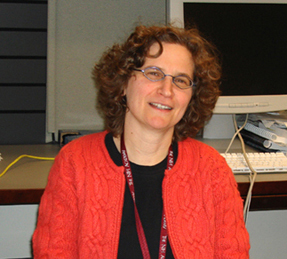
| T H E N I H C A T A L Y S T | S E P T E M B E R – O C T O B E R 2007 |
|
|
|
|
 |
| Sharon
Milgram |
Trainees Looking for Success
We had invited six tenured investigators to an informal panel discussion with our young trainees, most of whom are trying to figure out what to do with their lives (a process, I tell them, that doesn’t end at graduation). The event was scheduled for August 14 at Natcher.
This was the first OITE mentoring panel for NIH trainees, followed by lunch and a poster session so that students could meet and talk with our tenure-track investigators, and we’d planned for about 100 trainees. More than 200 students and postbacs poured into the room.
Initially we discussed characteristics of successful trainees. Panelist Polly Matzinger of NIAID set the tone. "We are the biggest biomedical research facility on the planet," she said of the opportunity afforded to the trainees. To succeed, she advised, one must be a "courageous masochist . . . because, at its best, research is 90 percent failure."
Les Biesecker of NHGRI echoed this sentiment, saying that an accomplished researcher will proceed "from failure to failure to failure with unprecedented optimism," a line he attributes to Stephen Emerson, president of Haverford College.
Sage advice (and dry humor) came also from the youngest on the panel, the newly tenured Danny Douek of the VRC. "Know your limitations, and ask when you don’t know," he said. "And understand that advice is not criticism." And take the advice, he advised.
Several trainees expressed worry that they weren’t on target with career goals. Barbara Vonderhaar of NCI told them to remain open to new ideas and new career possibilities. And Ken Fischbeck of NINDS added that there are many paths to a career in research; all the panelists encouraged the students to explore various career options—and, of course, to take advantage of all NIH has to offer.
Questions from the trainees ranged from how to plan a family and how to plan a divorce—from a research project going nowhere. This question brought winces from panel members, as each replayed in his or her own mind some scientific disappointment.
Roland Owens of NIDDK said such a decision is difficult for even the most experienced researcher. Douek described such a situation as being in a bad relationship—you’re too close to think rationally. He recommended seeking "outside advice" from colleagues.
The answer to many questions focused on developing a strong network of mentors and on seeking advice from many investigators.
By the end of the discussion, the panel was quoting Confucius and speaking of science as an art form.
After the hour discussion we proceeded to a box lunch and tenure-track investigator poster session. Yosuke Mukoyama of NHLBI, one of the poster presenters, called the event an excellent opportunity to meet and recruit young talent. So information clearly flowed both ways.
Please keep tuned for future trainee events by visiting our website.
Importantly, encourage your
trainees to avail themselves of your institute’s training office and OITE’s
services. ![]()
|
Job Fair Calling |
The NIH Research Festival, now in its 20th year, will be held September 25–28. Aside from the great opportunity to see some of the best in NIH intramural science, the festival includes the Job Fair for NIH Postdoctoral, Research, and Clinical Fellows on Thursday, September 27, from 11:30 a.m. to 3:00 p.m. at Natcher. The NIH Fellows Committee (FELCOM) is co-sponsoring the job fair with the NIH Office of Intramural Training and Education (OITE) and the Office of Research on Women’s Health (ORWH). Last year’s job fair was a great success, with more than 40 organizations represented and nearly 1,000 fellows attending. We expect a similar turnout this year. This year’s is the biggest job fair ever at NIH, and we highly recommend that NIH fellows attend—regardless of what stage you are in your training—just to make connections, familiarize yourself with the job market, and take the next step in your career. If you do attend, remember to dress professionally and to bring several copies of your résumé. NIH Director Elias Zerhouni will give the plenary address at the job fair, entitled "The Future Direction of Biomedical Research," from 10:30 a.m. to 11:30 a.m. at Natcher. A continental breakfast and box lunches will be available on a first-come-first-served basis. More information about the job fair is at this website including job postings at this web address. FELCOM is also hosting the FARE 2008 award ceremony and reception on September 24 at 4:15 p.m. at Natcher. FARE is an annual NIH-wide competition in which winning fellows receive a $1,000 travel grant. Information about this excellent funding opportunity is at FELCOM represents the collective body of NIH postdoctoral and clinical fellows. The committee comprises fellows in both clinical and basic science from each of the institutes and centers as well as from FDA-CBER and USUHS. The committee serves as a liaison between fellows and NIH administrative bodies and has ad hoc representation on several bodies, such as the NIH Training Directors Committee and the Graduate Medical Education Committee. We meet on the first Thursday of every month at 4:00 p.m. in Building 1, usually in Room 151. Anyone at NIH can attend. This Catalyst
column will serve as a recurring forum to highlight FELCOM activities.
This is our website. —Lori
Bibb
|